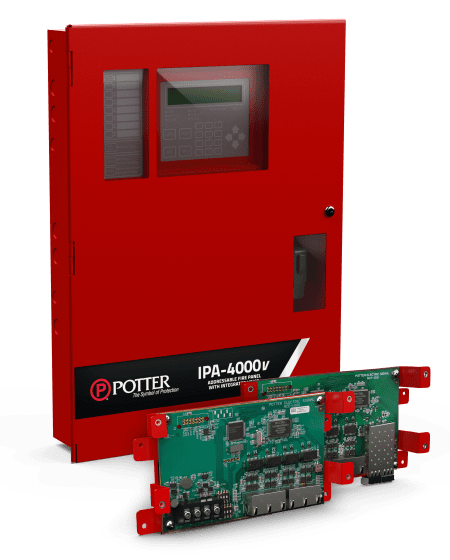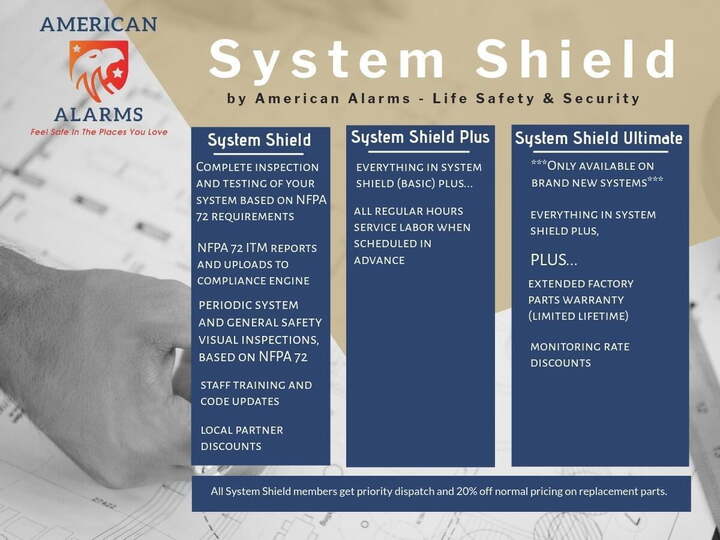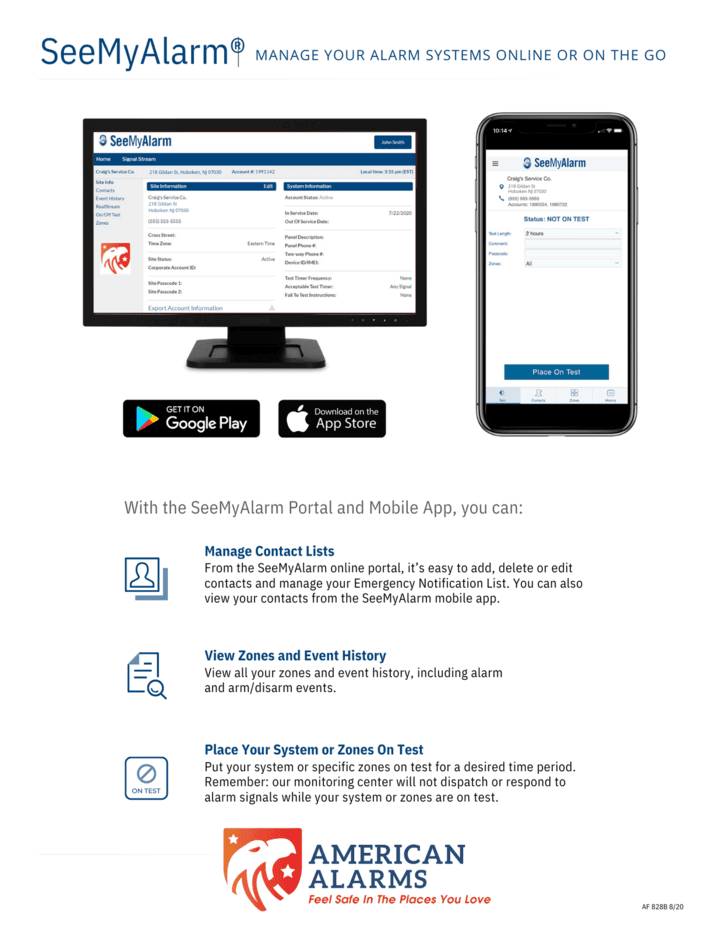Complete Fire Alarm Services From One Source
Since 1983, we've had a strong focus on learning and maintaining fire alarm systems. We will NOT simply look at your system and recommend replacement because we can't figure it out. Our licensed and trained technicians actually know how to FIX issues on your system. We will always offer that first. If continuing to maintain an older out-of-code system doesn't make sense (you decide) then we'll give you some options for a partial or complete update. We've also done MANY phased replacements, if that fits your budget better.
- We service most brands.
- Negotiate with the fire department, state, or federal agencies on your behalf.
- Keep old systems running longer, as long as they are compliant.
- Phased updates to fit your budget.
- One source for fire alarm design, parts, compliance, and monitoring.
- More tools to save you time.
From start to finish - you'll have the best value and the best result.
- NICET Level III and IV Designers
- In-house CAD drawing and printing for fast turn-around and quick changes
- NICET and/or ESA-certified technicians for all site work
- All team members licensed with State Fire Marshal
- Local fire department licensing (where needed)
- In-house training and product testing center
- Most complete inventory in Central Iowa with many brands in stock

American Alarms is your local direct distributor for these brands of equipment:
Potter Signal
Mircom Group
Hochiki America
Honeywell/FireLite (including SWIFT wireless)
Honeywell/Silent Knight (including SWIFT wireless)
Honeywell/Ademco (Vista series)
Gentex notification - horn/strobes, speakers
Honeywell/System Sensor notification - horn/strobes. speakers
Evax (voice notification)
STI (protective covers and shut-off buttons)
Wire/plastic cage covers for gyms
Explosion-proof devices for hazardous areas
In addition to the brands above, we also stock replacement parts and provide service for:
Honeywell/Notifier
Johnson Controls/Simplex
Siemens
Edwards/EST

Fire Alarm Compliance
Priority Scheduling
Easy Budgeting (levelized budgeting, expense control)
Code Compliant Assurance
Annual Testing & Inspection
Save on Trip Charges & Diagnostics (Included in the Plus plan service)
Save 20% on All Replacement Parts
Priority Scheduling
Easy Budgeting (levelized budgeting, expense control)
Code Compliant Assurance
Annual Testing & Inspection
Save on Trip Charges & Diagnostics (Included in the Plus plan service)
Save 20% on All Replacement Parts

ALARM SIGNAL MONITORING
Least time on hold in the industry
Free SeeMyAlarm mobile app
Only 1-year agreements (not 5-10 years like our competitors)
Daily Signal Checks (To proactively monitor irregularities)
Redundant 24/7 Central Stations (NJ, TX) means 100% uptime
Easy to Understand Operators



Frequently Asked Questions - Fire Alarm Systems
Q: If my fire alarm panel is beeping (just at the panel) what does that mean?
A: Fire alarm panels have a built-in piezo buzzer that sounds any time an input is active. Inputs can be 3 basic types - TROUBLE, SUPERVISORY, and ALARM. See below for further answers about each type.
Q: If my panel says it has a TROUBLE (sometimes abbreviated TRBL or TRB) what does that mean?
A: A TROUBLE signal coming to the panel from one of the inputs (pull station, detector, monitor module) is the lowest priority type of signal. Common TROUBLE signals are caused by wiring issues, moisture, cut wires, and unintentional grounding.
Q: My monitoring operator called and said, "Zone 15 smoke detector alarm east bedroom". What does that mean?
A: When the central station (monitoring center) calls, they will typically report a Zone Number, Device Type, and Location Description. The Zone Number doesn't mean much to anyone but the alarm company, but the Device Type and Location Description can help you locate which device created the signal.
Q: When my monitoring center talks about a ZONE, what are they talking about?
A: A zone can be one device or a group of devices (inputs), depending on the system. On newer addressable type systems, each detector or other device is a zone. On older conventional type systems, a zone could be a group of devices, an entire floor, or the whole building.
Q: If we have a false alarm on our system, will the fire department charge us for dispatching anyway?
A: Whether you get charged for a false alarm that dispatches the fire department, depends on a few factors. Most departments give at least one freebie before charging. After that, it could be $100 - $500 per trip for false alarms depending on which department serves you. These fines usually increase the more false alarms you have per year. This is designed to encourage you to keep the system working properly with minimal false alarms.
Q: I have a trouble on my panel that says "Ground Fault". What does that mean, and will it keep coming back if I Silence or Reset the panel?
A: A Ground Fault is usually caused by an energized conductor (wire) touching a metal box, conduit, or structural member (like all-thread or metal beam). Until the problem is corrected, this signal will resound every 24 hours when your panel does its daily test signal to the central station. On older unmonitored panels, this fault may allow silencing and not resound again.
Q: The fire department told me that our system must be tested/certified every year, is this true?
A: The national code and Iowa code require at least annual testing of every commercial fire alarm system. Some systems that protect educational, elderly housing, health care, and some other types of buildings may be required to be tested more frequently.
Q: My fire alarm testing company just pulls a pull station and turns on the horn/strobes a minute, then hangs a tag on the panel. Is this all that's required to satisfy the code?
A: Unless your entire system is one pull station, this is not enough. The code requires a certain percentage of all inputs on a system to be activated and tested for proper function. In addition, any integrated/connected systems like HVAC, fire sprinkler, and access control must be tested as well.
Q: If I'm in a fire alarm monitoring contract, how easy is it to get out and change companies?
A: This is a question we hear a lot, since we only have one-year agreements. Many alarm companies use 2, 3, 5, or even 10-year monitoring agreements with customers. Getting out of any legal contract can be a challenge, especially if it's written in the vendor's favor by lawyers who only do this type of thing. The best thing to do (for next time) is to seriously consider the agreement term length before signing. Is this long-term contract a way to give sub-par service and know the customer can't leave?




